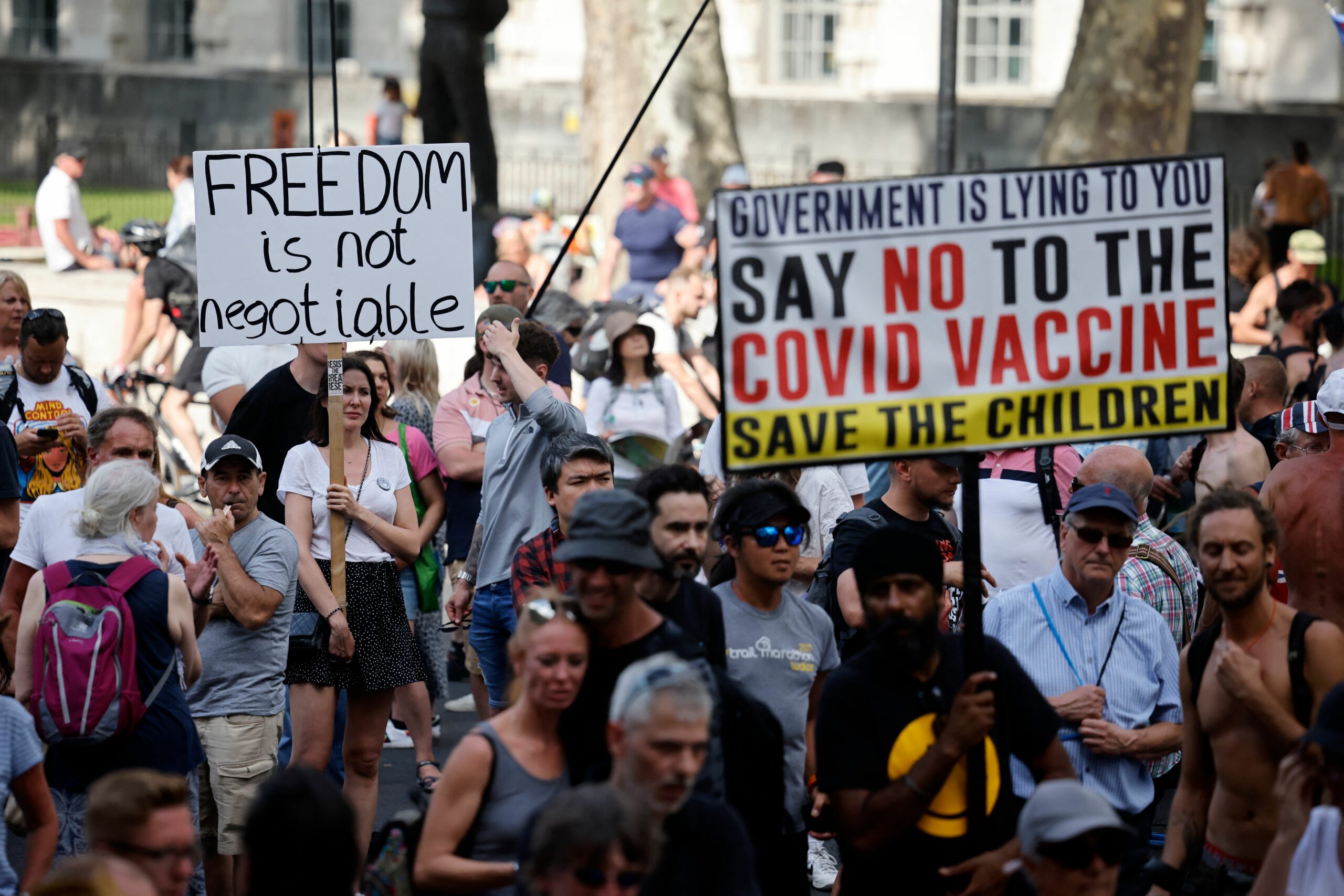Anti-vaccine groups in the UK are now seeking to target businesses.
This assessment was issued to clients of Dragonfly’s Security Intelligence & Analysis Service (SIAS) on 26 August 2021.
The tone among conspiracist groups that we monitor online has been proving increasingly hostile towards organisations and companies that they believe are promoting vaccinations. This is in addition to criticism of the government, the pharmaceutical sector and the media. We have also seen online calls for direct actions against specific organisations (we have contacted those clients – in the tech and pharmaceutical sectors – that we have seen named).
We have not seen credible calls for violence, however. Protesters have tried to storm the offices of at least three media companies in central London in the past fortnight. Those incidents happened during or on the fringe of larger demonstrations. But we warn that acts of vandalism against offices are probable near a planned march in London on 28 August; so far they have not specified where, and these groups have changed their plans at the last minute. For now, such groups do not appear able to coordinate actions that involve more than entering building lobbies.
The focus of anti-vaccine groups in the UK appears to have shifted in recent weeks from spreading disinformation online to building a visible presence in the streets. The main groups behind recent protests have been Stop New Normal and Save Our Rights UK. Others include Official Voice, Stand Up X and Event 201. What these groups share is the belief that the pandemic and vaccines are a tool for a ‘globalist elite’ to control people. Much of their recent discourse has centred on opposition to vaccine mandates.
The government remains the primary target of hostile messaging on anti-vaccine social media accounts and online encrypted channels that we monitor. That said, we have seen more references than usual to specific organisations over the past month. These were pharmaceutical companies, media – considered as the ‘government’s mouthpieces’ – and organisations that such groups allege to be engaging with or promoting vaccinations, particularly in the tech sector.
We assess that prominent organisations publicly stating that their staff in the UK must get vaccinated are likely to become targets of such hostile messaging. Few organisations in the country have done this so far. But of those, some have reported that their senior staff have received threat letters and were targets of doxxing campaigns. These involve sharing the personal information of staff or company addresses online and encouraging followers to harass them. We have not seen any activists showing up at the premises of such organisations, however.
The targeted actions that anti-vaccine groups have carried out in recent weeks point to an improving ability to plan and coordinate. Organisers appear to have successfully planned a march to the ITN headquarters on 23 August without alerting the police, using private messaging apps. And the groups that stormed into the Television Centre on 9 August announced a different target before changing it at short notice. Such tactics suggest that these up-until-now fringe and fairly obscure groups are now emulating the methods of larger activist organisations, such as Extinction Rebellion.
There are few signs that anti-vaccine groups in the UK have the capabilities to plan and mount more complex actions, however. Their two most disruptive events so far have been limited to a few hundred protesters entering the hall of a building. And in one of these two cases, on 9 August, activists seemingly targeted the wrong facility. We have not been able to find any reports of targeted action against a tech company that Stop New Normal had called for last week, suggesting that either it did not take place or that it was very small.
Anti-vaccine groups appear to have been trying to limit the use of violence during their protests. This is despite the aggressive rhetoric that we have seen them using online. Recent anti-vaccine demonstrations have passed off largely peacefully, resulting in only sporadic scuffles between protesters and police, and harassment of on-scene reporters. The main risk for targeted businesses is probably demonstrators storming into their buildings and verbally harassing staff, particularly those with a prominent public profile.
Image: Anti-vaccine protesters in central London on 14 June 2021. Photo by Tolga Akmen/AFP via Getty Images.




